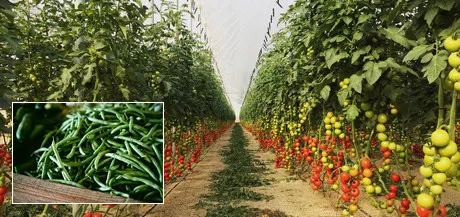It happened a few times in the past organic campaign - organic greenhouse vegetables that had to be sold at lower prices to retailers. This, despite the market prices being higher. There is a simple reason for this, according to the Dutch company, Bioworld's, Job van den Berg.
“Retailers do not want the prices difference between organic and conventional products to be too large. For example, they cannot get an organic EUR2 cucumber sold. Not if it on the shelf next to its conventional counterpart that is going for, for example, EUR0,50. Then, continuity trumps prices. You want to be able to supply your client year-round."
Cucumber farmers are suffering
It is cucumbers, in particular, that are having a bad year. Everyone remembers the images of the dumped cucumbers that were circulating around New Year. Organic cucumbers have not been spared. "It is very difficult this year," says Job. "Ironically enough, it seems that cultivating without any major problems is counterproductive for growers. These issues include viruses."
"In my now ten-year organic career, I have never seen such structurally low prices as during this campaign in January and February. Old Spanish warehouse prices are at around EUR5,5 to EUR6 for a box of 12 pieces. This makes this, without a doubt, a disastrous year for growers. But you have to ask yourself whether the previous years were maybe extremely good years," he continues.

Tough for tomatoes, but stable lines for aubergines, courgettes, bell peppers
Organic tomato sales are difficult at times. "We have had to accept conventional programs a few times. This is to get rid of the stock. This is especially for truss, cherry and plum cherry tomatoes."
To his satisfaction, John saw few problems with courgettes, aubergines, and bell peppers. "Everything is going well. There was talk of high prices for a few weeks. However, even after that, the demand remained fairly good. These lines are stable, which is what you want."
Good market for beans, cultivation more difficult
Bioworld focuses on traditional greenhouse vegetables. Besides this, however, they also grow beans in Spain. "The market is good there but cultivation is more difficult. Here and there, we had problems with low temperatures and relatively too much moisture. The string beans withstood this well. For green beans, however, it caused more problems."
Healthy Dutch/Spanish balance
The Dutch organic greenhouse vegetable season is starting again. This, however, does not mean the end of the Bioworld's Spanish branch's season. "The winter production is coming to an end. I expect we will run through about three or four weeks with cucumbers. This is also the case with bell peppers. We still have tomatoes until the end of May. After that, we will start with new crops," explains Van den Berg.
At Bioworld, it is all about a healthy balance between the Netherlands and Spain. "We farm in Spain because we have shortages in the Netherlands. And not only in winter. There are enough clients who prefer te trade in Spanish products. Even during the Dutch summer."
"This is why it is important that both Bioworld's Dutch and Spanish branches are in constant consultation with each other. This maintains an optimal balance in the chain and our lines," Job concludes.
For more information:
Bioworld
www.rootedinthefuture.com
info@bioworld.nl
Job van den Berg
j.vandenBerg@biomontana.com
